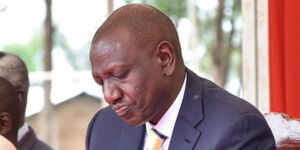Athletes representing Kenya at the Tokyo 2020 Olympics returned to the country in the early morning hours of Wednesday, August 11.
Their reception at the Jomo Kenyatta International Airport (JKIA) caused an online stir, notably due to the absence of Ministry of Sports officials.
Kenyans demanded better treatment of the team that bagged a total of 10 medals (4 gold, 4 silver and 2 bronze).
Amid the debate, a section of Kenyans wondered if the Kenya Revenue Authority (KRA) would seek a share of the award money that the athletes worked so hard to gain while raising the Kenyan flag high.
A spot check by Kenyans.co.ke, however, established that KRA does not collect taxes on the medals or on the cash prizes that athletes collect abroad.
The tax collection stopped in 2013 after the election of then Cherangany MP Wesley Korir - the first marathoner to get to Parliament. He quickly lobbied Parliament to pass a motion requiring KRA to give concessions on athletes.
"We need to protect our athletes against harassment from Kenya Revenue Authority (KRA). Right now, athletes who participated in international events ten years ago are being sent letters asking them to pay taxes. Where was KRA ten years ago? We need to protect our athletes against double taxation."
"I have run in America and 30 per cent tax is taken by the Government while 15 per cent is taken by the agent. When I come here, the country tells me that I have to pay another 30 per cent. Where will those athletes get money? We are demoralizing them instead of helping them to become who they are," Korir told Parliament at the time.
Speaking to Kenyans.co.ke on Wednesday, August 11, the legendary athletics champion Ezekiel Kemboi confirmed that the athletes no longer pay taxes in Kenya whenever they win cash or medals abroad.
Kemboi admitted that candidates who secure a podium finish in the Olympics and any other international athletic competition get more than medals.
Apart from the priceless moment of hearing the national anthem being played in the stadium (when they finish first) athletes who finish among the top three also get cash rewards.
Kemboi reiterated that the prize money varies depending on the medal. He disclosed that all the prize money is subjected to taxation by the host country.
"We are required to pay tax to the host nation. If the games are hosted in Tokyo, you pay Tokyo," he revealed.
He added that the tax rate is not fixed and depends on the host nation.
"The tax rates are different. In Italy it is 12%, United Kingdom 30%, America 35%," stated Kemboi.
This means that an athlete who wins Ksh2 million will pay between Ksh300,000 and Ksh700,000 to a foreign government.
In addition, the steeplechase champion set the record straight about taxation of the proceeds of athletics competitions by the Kenyan government. He stated that the government exempted athletes from taxation of the prize money.
Fortunately for Team Kenya participating in the 2020 Tokyo Olympics, the Japanese government in 2019 passed a law exempting non-resident athletes from paying tax for their spoils.
Not all Olympic stars are as lucky. Forbes recently reported that the US tax collection body was the biggest winner of the Tokyo Olympics - collecting 37 percent tax on the 2,941 medals American athletes won as well as cash awards running into hundreds of millions of dollars.
An official from the Ministry of Sports intimated Kenyans.co.ke that athletes who participated in the Olympics are also paid tax-free allowances.












